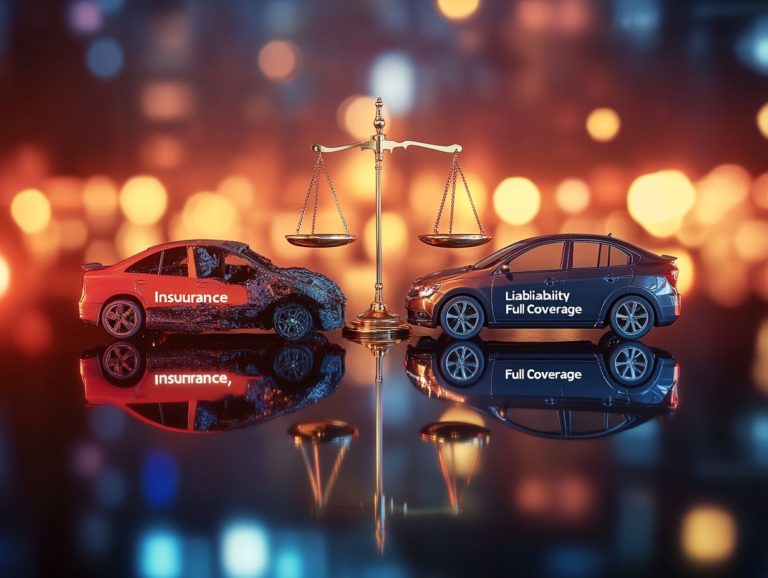How to Compare Auto Insurance Policies Effectively
Navigating the world of auto insurance can feel daunting, especially with so many policies and coverage options available.
Understanding the different types of coverage is essential for protecting yourself and your vehicle. This guide walks you through critical factors to consider when comparing policies like premiums, deductibles, and coverage limits.
You ll find valuable tips for selecting the right policy, ensuring you make an informed choice that fits your needs and budget.
Dive in to discover how to secure the best auto insurance tailored to your lifestyle!
Contents
- Key Takeaways:
- Understanding Auto Insurance Policies
- Factors to Consider When Comparing Policies
- How to Effectively Compare Auto Insurance Policies
- Tips for Choosing the Right Auto Insurance Policy
- Frequently Asked Questions
- What factors should I consider when comparing auto insurance policies?
- How can I determine which policy offers the best coverage for my needs?
- Is it important to compare insurance policies even if I already have coverage?
- What are some common mistakes to avoid when comparing auto insurance policies?
- Can I save money by comparing auto insurance policies?
- How often should I compare auto insurance policies?
Key Takeaways:

- Know your coverage types and why they matter!
- When comparing policies, factor in premiums, deductibles, coverage limits, and additional features.
- Gather quotes, consider your needs and budget, read policy details, and ask questions to clarify doubts.
Understanding Auto Insurance Policies
Understanding auto insurance policies is essential for any driver wanting to protect themselves and their vehicles. Whether you re exploring car insurance for the first time or reassessing your policy, grasping the components of auto insurance can significantly impact your premiums and coverage requirements.
Key factors like the type of coverage, limits, and the reputation of insurance providers are vital for your financial well-being on the road. By evaluating your driving history and personal details, you can tailor your coverage options to suit your needs.
Types of Coverage and Their Importance
Different types of auto insurance coverage offer varying degrees of protection. It s essential to grasp the significance of each option.
For example, liability coverage is often legally required. It provides a safety net against financial responsibility if you’re in an accident that injures someone or damages property. Full coverage can be especially advantageous for new car owners, as it shields you from liability claims and covers damages from collisions, theft, or natural disasters.
Personal injury protection (PIP) is crucial for managing medical expenses, especially if you frequently transport passengers. Want to know what coverage is right for you? Let s explore collision and comprehensive options!
Comprehensive coverage shines in non-collision incidents like falling debris or vandalism, while collision coverage is specifically for accidents involving other vehicles. These insights empower you to tailor your insurance policies according to your lifestyle and risk factors.
Factors to Consider When Comparing Policies
When comparing car insurance policies, consider various factors to select the best option for your unique needs and budget. To ensure you make an informed choice, learn how to compare coverage options effectively. Insurance quotes from different providers can vary significantly based on your driving history, personal information, and chosen coverage limits.
Understanding the reputation of insurance companies is crucial for gaining insight into their customer service and claims handling efficiency. Don t miss out on possible discounts whether for safe driving or bundling multiple policies which can help reduce your car insurance rates.
Start comparing policies today to secure the best coverage for you and your vehicle!
Premiums
Understanding your insurance premium is important. It significantly shapes your overall car insurance costs and budget.
Several factors influence your premium, including your driving record, the type of vehicle you choose to insure, and your geographical location.
If you have a track record of safe driving, you may be eligible for discounts that can lower your premiums. Choosing vehicles with higher safety ratings also helps, as insurers reward owners of safer cars. Living in areas with lower crime rates may lower your premiums.
Many insurance companies offer incentives for policyholders who complete legitimate driving courses or maintain an excellent credit score. By exploring these options and discussing potential discounts with your insurer, you can save money and boost your protection!
Deductibles

The auto deductible is an important part of your auto insurance policy. It influences both your overall costs and coverage.
A deductible is the amount you pay out-of-pocket before your insurance coverage kicks in during a claim.
Understanding how deductibles work with different coverage types, like collision and comprehensive, helps you make informed decisions that match your financial situation and protection needs.
Finding the right balance between your deductible and coverage limits is key to effective insurance planning.
When determining the deductible amount, it s important to think about how it affects your monthly premiums and out-of-pocket expenses. For instance, choosing a high deductible often leads to lower premiums, making it a good option for those who are accident-free or have savings to manage unexpected costs.
On the other hand, a low deductible may seem advantageous during a loss event, as it reduces your immediate cash outlay, but this can lead to higher monthly expenses overall.
Evaluating your circumstances like whether you frequently commute in busy urban areas or enjoy the occasional road trip can help you find the right balance of risk and affordability that suits your driving habits.
Coverage Limits
Coverage limits define the maximum amount your insurance company will pay for a covered loss. It s crucial to understand these limits when selecting your car insurance policy.
Opting for higher limits can offer better protection, especially in states with high car insurance rates or when driving a new vehicle, like the 2023 Toyota Corolla. Balancing your coverage limits with your insurance needs ensures you re well protected without overspending on unnecessary options.
Different types of coverage like liability, collision, and comprehensive insurance have distinct limits, each serving a unique purpose. Liability coverage protects you if you re at fault in an accident causing injury or property damage to others. Full coverage typically combines liability with added protections for your vehicle and is especially advisable for newer models.
To assess your protection needs accurately, consider factors like your driving habits, the value of your vehicle, and state requirements. Evaluating these aspects will help you find the right limits to protect against potential financial losses effectively.
Key Features and Benefits
Many auto insurance policies offer a range of additional features and benefits that can enhance your coverage and provide you with peace of mind. Options like personal injury protection, roadside assistance, and rental car reimbursement can be essential in unexpected situations.
Personal injury protection is coverage that pays for medical costs if you’re injured in an accident. Roadside assistance is crucial for road trips, ensuring that help is just a phone call away during any breakdowns.
If you rely on your vehicle for daily commuting, rental car reimbursement might be particularly beneficial; it guarantees that you stay mobile even while your car is in the shop. By exploring the available insurance discounts, you can further reduce your premium while ensuring that you receive adequate protection through these supplementary products.
Each of these options is designed to cater to different needs, allowing you to customize your policy and secure peace of mind that is perfectly suited to your unique circumstances.
How to Effectively Compare Auto Insurance Policies
Effectively comparing auto insurance policies is crucial for securing the coverage that aligns perfectly with your unique needs and budget. Start by collecting insurance quotes from various companies and learn how to compare auto insurance quotes, paying close attention to the specifics of each policy, including the types of coverage offered and their respective premiums.
Evaluating your insurance history and driving behavior can provide valuable insights, enabling you to negotiate more favorable rates. Additionally, understanding how to read an auto insurance policy will empower you to make a well-informed and confident decision while being meticulous in your comparison of quotes.
Gather and Compare Quotes
Gathering and comparing quotes from various auto insurance companies is a crucial step in securing the best coverage tailored to your needs. Make sure you grab quotes from multiple insurers and assess them based on key features to look for in auto insurance policies, pricing, and the reputation of the insurers involved.
Pay close attention to customer service ratings and claims handling experiences, as these elements can significantly influence your satisfaction after the purchase.
Begin by identifying the specific coverages that matter most to you, whether that s liability, collision, or comprehensive coverage. Be sure to include personal details such as your vehicle type, driving history, and location to receive accurate estimates.
Once you have your quotes, evaluate them against criteria like deductibles, limits of liability, and additional perks such as roadside assistance. Understanding the terminology and conditions in each quote will empower you to make an informed decision.
Seeking out online reviews or discussing your options with friends and family can also provide valuable insights into the reliability of the insurance providers you re considering.
Start gathering your quotes today for the best deal!
Consider Your Needs and Budget

Before you settle on an auto insurance policy, it s essential to look closely at your individual coverage needs and budget. Consider your driving history and evaluate your driver type whether you’re a seasoned pro or just starting out because these factors will inevitably influence your insurance costs.
Invest some time in researching the reputations of various insurance companies to ensure that you select a provider that truly aligns with your financial and coverage requirements.
If you re a family-oriented driver, you might prioritize a policy with comprehensive coverage to shield yourself against unforeseen events. On the other hand, a young, tech-savvy driver could find value in usage-based insurance that rewards safe driving habits.
Reflecting on your unique lifestyle can lead to substantial savings or enhance your peace of mind. It s also vital to understand how your specific vehicle type affects premium pricing; a classic car enthusiast, for instance, may require specialized coverage that differs from standard policies.
Therefore, conducting a thorough self-assessment not only personalizes your insurance experience but also optimizes your budget.
Read and Understand Policy Details
Reading and understanding the details of your auto insurance policy is essential. It helps you grasp your coverage options and obligations fully.
By taking time to look closely at the different sections, you can find the specifics of your coverage. Also, you can identify any exclusions or limitations that might apply if an accident occurs.
Pay attention to terms like deductible, which is the amount you pay before your insurance helps, and liability limits. Understanding comprehensive and collision coverage is crucial too.
Many people overlook endorsements. These can enhance your policy or fill specific gaps.
Being aware of these common pitfalls gives you the power to make informed decisions. This way, you can choose a plan that meets your needs and avoid unwelcome surprises.
Ask Questions and Clarify Doubts
Asking questions and seeking clarification from insurance agents is key. Don t hesitate to dive into inquiries about everything from coverage types to comparing quotes.
A good agent will gladly assist you and provide detailed answers. Understanding your coverage needs helps prevent potential issues later.
Open communication is vital. It deepens your understanding of various policy options and fosters a good relationship with your agent.
For example, you might want to ask about specifics of each coverage type or how deductibles could affect your rates.
Remember to ask about available discounts. Knowing what questions to ask can greatly enhance your insurance satisfaction and help tailor the policy to fit your unique situation.
Tips for Choosing the Right Auto Insurance Policy
Selecting the right auto insurance policy can feel overwhelming. However, learning how to use online tools to compare insurance can provide a few strategic insights to make the process easier.
Start by assessing your coverage needs. Consider your driving habits and lifestyle.
Be sure to look for available discounts; they can lead to savings you don’t want to miss. Comparing different quotes from various providers ensures you find the perfect fit.
Factors to Prioritize
When choosing an auto insurance policy, prioritize certain factors to find the best coverage. Start with the reputation of the insurance companies; this can impact your claims experience and customer service quality. Additionally, be sure to learn how to find hidden costs in auto insurance policies to avoid unexpected expenses.
Check that the coverage limits match your personal situation. Evaluate the different insurance products that cater to your driving history.
For instance, if you have a safe driving record, you might prefer lower premiums. If your record has accidents, you may want comprehensive coverage options for better protection.
Don’t overlook the discounts for safe driving or bundling policies; they can significantly affect your final decision. Understanding the terms and conditions of your policy is crucial; hidden exclusions could leave you vulnerable.
By considering these factors thoughtfully, you can make informed choices that give you peace of mind on the road.
Common Mistakes to Avoid

Don’t let common mistakes cost you money! Avoiding common mistakes when purchasing auto insurance can save you both money and ensure you have the coverage you truly need. One prevalent pitfall is neglecting to evaluate quotes. Many drivers skip the essential step of comparing rates while shopping for car insurance.
Ignoring your driving behavior and how it impacts your monthly payments can lead to unnecessary costs. It s vital to understand the different kinds of protection you can get with your insurance and how they relate to your specific situation to make informed decisions.
Many people overlook discounts that could significantly lower their premiums. These can range from maintaining a safe driving record to bundling multiple policies. It s wise to ask about promotional offers that might not be immediately apparent.
Failing to read the fine print in insurance policies can lead to unwelcome surprises when it comes time to file claims. Many misjudge their actual insurance needs, either over-insuring or under-insuring themselves. This underscores the importance of thorough research and awareness of personal circumstances.
By staying vigilant and informed, you can navigate the complexities of auto insurance with greater ease and confidence.
Frequently Asked Questions
Here are answers to some common questions about comparing auto insurance policies:
-
What factors should I consider when comparing auto insurance policies?
When comparing auto insurance policies, consider coverage limits, deductibles, monthly payments, discounts, and how to compare insurance for family vehicles.
-
How can I determine which policy offers the best coverage for my needs?
The best way to determine which policy offers the best coverage is to assess your personal driving habits and needs, then compare insurance policies based on those factors.
-
Is it important to compare insurance policies even if I already have coverage?
Yes, it’s important to compare insurance policies periodically, even if you already have coverage. This ensures you are getting the best deal and coverage for your current needs.
-
What are some common mistakes to avoid when comparing auto insurance policies?
Common mistakes to avoid include not reviewing coverage limits, not considering all available discounts, and neglecting to research the company’s customer service and claims process.
-
Can I save money by comparing auto insurance policies?
Yes, comparing auto insurance policies can often lead to significant savings. By shopping around, you may find a better deal with lower monthly payments and discover how to evaluate discounts when comparing policies.
-
How often should I compare auto insurance policies?
It’s recommended to compare auto insurance policies at least once a year. However, major life changes or changes in your driving habits may also warrant a policy comparison. To effectively navigate this process, check out how to navigate the insurance comparison landscape to ensure you have the best coverage for your current situation.






